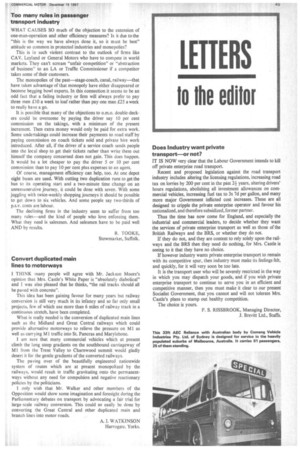Too many rules in passenger transport industry
Page 47

If you've noticed an error in this article please click here to report it so we can fix it.
WHAT CAUSES SO much of the objection to the extension of one-man-operation and other efficiency measures? Is it due to the "this is the way we have always done it, so it must be best" attitude so common in protected industries and monopolies?
This is in such violent contrast to the outlook of firms like CAV, Leyland or General Motors who have to compete in world markets. They can't scream "unfair competition" or "abstraction of business" to an LA or Traffic Commissioner if a competitor takes some of their customers.
The monopolies of the past—stage-coach, canal, railway—that have taken advantage of that monopoly have either disappeared or become begging bowl experts. In this connection it seems to be an odd fact that a failing industry Or firm will always prefer to pay three men £10 a week to loaf rather than pay one man £25 a week to really have a go.
It is possible that many of the objections to o.m.o. double-deckers could be overcome by paying the driver say 10 per cent commission on the takings, with a minimum of the present increment. Then extra money would only be paid for extra work. Some undertakings could increase their payments to road staff by paying commission on coach tickets sold and private hire work introduced, After • all, if the driver of a service coach sends people into the local shop to get their tickets rather than write them out himself the company concerned does not gain. This does happen. It would be a lot cheaper to pay the driver 5 or 10 per cent commission than to pay 10 per cent plus expenses to an agent.
Of course, management efficiency can help, too. At one depot eight buses are used. With cutting two duplication runs to get the bus to its operating start and a two-minute time change on an unremunerative journey, it could be done with seven. With some juggling with twice-weekly shopping journeys it should be possible to get down to six vehicles. And some people say two-thirds of p.s.v. costs are labour.
The declining firms in the industry seem to suffer from too many rules—and the kind of people who love enforcing them. What they need is salesmen. And salesmen have to be paid well AND by results.
R. TOOKE, Stowmarket, Suffolk.












































































































